Consolidation and Standardisation needs in International and Global Governance
The OneGoal Initiative for Governance
Session 290
A first look on the basis of process
The concept of consolidation - matching system and goals, matching goals and actions, removing incoherences and unnecessary redundancies, filling gaps, boosting synergies and more -, was introduced in two prior workshops at WSIS. In this session we will look at where consolidation fits in an encompassing governance process and look into the standardisation needs of an overall platform.
Indeed, OGI proposes as part of its Qaucus programme the Resilience-to-Robustness Equilibrium process (RRE), for international and global governance, where consolidation intervenes in two steps of said process and we will briefly describe how this fits in RRE.
The required ICT platform will further involve standards and we will discuss initial ideas in that regard.
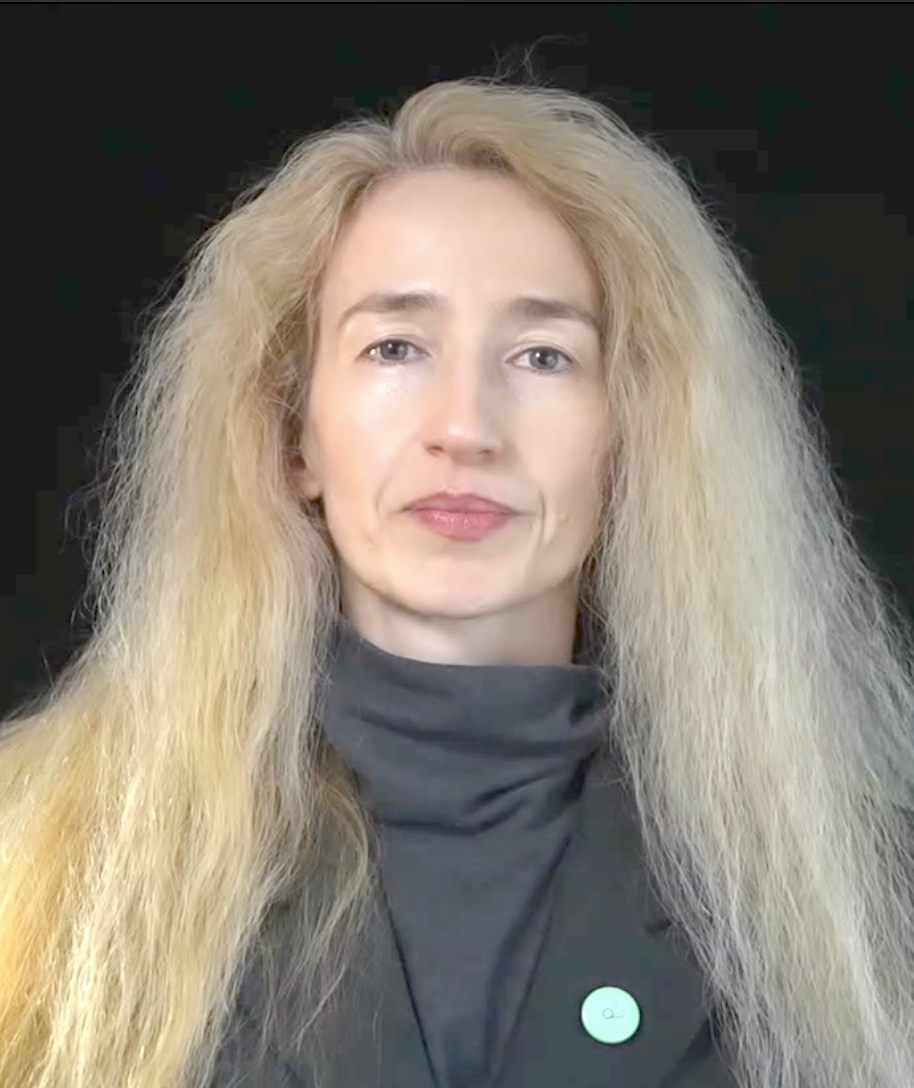
Alève Mine is the first advisor on risk recursion, the risk arrow and the Resilience-to-Robustness Equilibrium (RRE). She holds a MSc degree from the EPFL in micro-engineering (robotics, automation, nanotechnology, chips, sensors, materials, lasers, signal processing, production lines, etc.), a finance diploma (financial analysis, valuation) from the St. Gallen Management Institut (SGMI), and was 2011 laureate in media technology and telecommunications at the International Telecommunications Union (ITU-T). In 2015, she founded the Zurich AR/VR Meetup (keyword "the metaverse”) which was named Key Swiss Player in the field on the GDI Gottlieb Duttweiler Institut map (2017). She is author the RRE White Paper (2024) and of three books -- The Margin Problem (forthcoming in 2024), Storytelling Automation Principles (2021), and the science fiction novel The Premise (2012) under the pen name Solomon Batelberg.
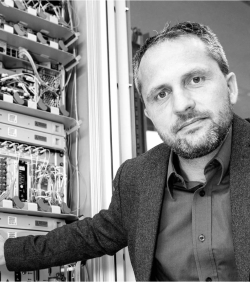
Sébastien Rumley is an Associate Professor at the University of Applied Sciences and Arts Western Switzerland (HES-SO). He is affiliated with the Department of Computer Science and Communication Systems in Fribourg and is a member of the iCoSys institute. Prof. Rumley earned his M.S and PhD from EPFL in 2005 and 2011, respectively. Following his academic achievements, he joined the Lightwave Research Laboratory at Columbia University, where he remained until 2018.
After gaining valuable industry experience, Prof. Rumley assumed the role of Associate Professor of Software Engineering in 2021. His extensive research background encompasses optics, optical networking, and computer architecture, often utilizing simulation methods. He is widely recognized as an expert in high-performance optical interconnects.
Prof. Rumley's current areas of interest include computing infrastructure (both cloud and physical), energy efficiency in computing and networking, smart building/farming, and data engineering. With over 80 publications to his name, he has received multiple awards such as the Best Paper Award at the SuperComputing conference in 2016 and the Hans Meurer Award (Best Paper award of the ISC-HPC conference) in 2018.
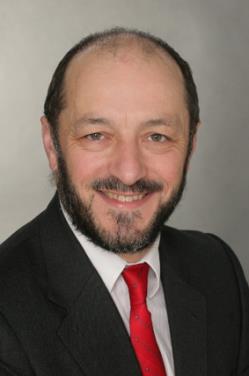
Ian Dunmill graduated in electrical and electronic engineering in 1983. He worked in the weighing industry before joining the UK National Weights and Measures Laboratory in 1985. In 1999, Ian became Assistant Director at the BIML in Paris, where he has been responsible for following a range of OIML technical activities. Of particular current interest is the OIML’s work on electric vehicle charging and medical devices He also has particular responsibility for the OIML’s activities in Countries and Economies with Emerging Metrology Systems, the OIML’s online training initiative, and digitalisation issues. Ian is the Organisation’s liaison contact for UNIDO, WTO, WHO and ISO DEVCO, as well as following regional activities in African and Euro-Asian countries. He was also the chair of the International Network on Quality Infrastructure (INetQI) in 2016-2018.
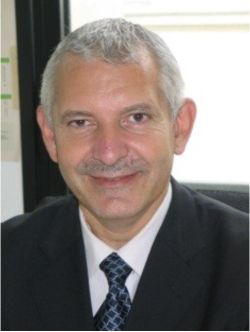
Mr Christophe Xerri, president of The Sailing Brain Consulting, is an independent international expert with more than 30 years of experience in the field of energy, waste management, circular economy and multi-cultural management.
From 2015 to 2022, he was Director at the International Atomic Energy Agency in charge of fuel cycle, waste management and research reactors. Before his appointment to the IAEA, he served from 2011 to 2015 as Counsellor to the French Embassy in Japan and in Mongolia, with a focus on nuclear applications, innovation and post-crisis management.
He started his career in finance in Japan and Luxembourg. He joined COGEMA (now ORANO) in 1991, in the field of nuclear fuel recycling and waste management. He then moved to uranium mining and innovative enrichment technology. Later, he worked in weapon’s non-proliferation and then was assigned to the office of the President of AREVA (nuclear, renewables, electricity transmission equipment) in charge of international affairs.
He moved to Japan in 2007 and became Vice President of Mitsubishi Nuclear Fuel in 2009, where he was also involved in handling the consequences of the earthquake and tsunami of March 2011.
Mr Xerri holds an Engineer’s degree from Ecole Centrale de Lyon, France, a Master of Science from Salford University, UK; and an MBA from Institut Supérieur des Affaires in France.
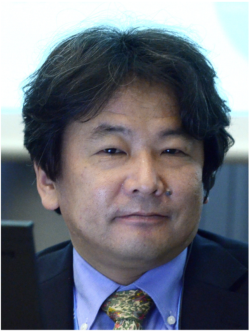
Since 2009, he is the Rapporteur of Question 28 "Multimedia Framework for e-Health Applications" in Study Group 16 of ITU-T. He appeared as speakers at several conferences on e-health, including IEEE-ICC, WSIS, and Telecom World, all in 2011. He actively participated in the collaboration between ITU-T, ITU-D and WHO, and was an active participant in the Joint ITU-WHO Workshop on e-Health Standards and Interoperability, Geneva, 2012.
After joining the Information Science Lab, NTT Basic Research Labs, in 1989, he did research and development in artificial intelligence.
Since 1998 until 2002, he was a research member of "Creating the Brain" Research Project of the JST (Japan Science and Technology Agency)'s CREST ("Core Research for Evolutional Science and Technology") Program. He was also a lecturer, 1998-2006, at the School of Allied Health Sciences, Kitasato University, Japan. In 2004, he led the development with the University of Tokyo, Japan, on a health information system using wearable sensors that measured the hippocampal function in the brain to detect early signs of dementia.
He is also a co-chair of ITU-T's Focus Group on Media Accessibility as well as the coordinator of IPTV-Global Standards Initiative.
-
 C2. Information and communication infrastructure
C2. Information and communication infrastructure
-
 C3. Access to information and knowledge
C3. Access to information and knowledge
-
 C6. Enabling environment
C6. Enabling environment
-
 C7. ICT applications: benefits in all aspects of life — E-science
C7. ICT applications: benefits in all aspects of life — E-science
-
 C11. International and regional cooperation
C11. International and regional cooperation
The discussed process entails an (C2) information and communication infrastructure; This adds a paragraph to C3 in that it enhances the access of the decision makers themselves to knowledge; Contributes to C6 in that a possible optimal consolidation acts in a similar way to interoperability, empowering any intended activity based on governance structures; to C7 helping build on scientific knowledge through a common reference model; and to C11 as a basic requirement for all players to collaborate.
-
 Goal 17: Revitalize the global partnership for sustainable development
Goal 17: Revitalize the global partnership for sustainable development
This supports SDG 17 for partnerships for the goals in that it encourages and supports a more powerfully coordinated global action. In particular, targets 17.13 to “enhance global macroeconomic stability, including through policy coordination and policy coherence” and 17.14 “Enhance policy coherence for sustainable development” in question.
White Paper https://doi.org/10.5281/zenodo.10633773